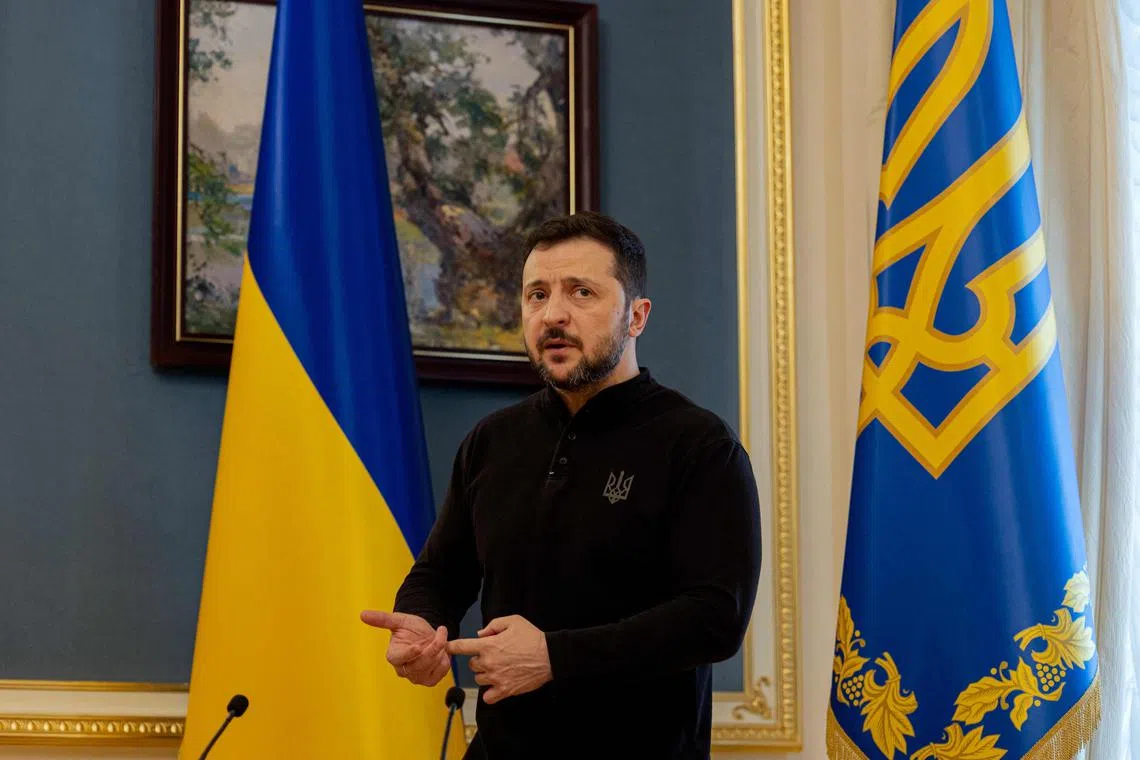Ukraine’s Zelensky calls for US pragmatism after Trump calls him a ‘dictator’
Sign up now: Get ST's newsletters delivered to your inbox

Ukrainian President Volodymyr Zelensky giving a press conference in Kyiv on Feb 19.
PHOTO: AFP
Follow topic:
KYIV - Ukrainian President Volodymyr Zelensky said he was counting on unity at home and in Europe as well as pragmatism from Washington, striking a conciliatory tone after US President Donald Trump delivered a public scolding.
Mr Trump said on Feb 19 that Mr Zelensky was a "dictator without elections"
It was hitherto unthinkable rhetoric from a US leader given Washington's role as a key ally of Ukraine since Russia's full-scale invasion three years ago.
The US president is pushing for a quick deal to end the Ukraine war and has alarmed Washington's European allies by leaving them and Ukraine out of initial talks with Russia
European leaders have responded by pledging to step up spending on defence and some are considering a US-backed European peacekeeping force for Ukraine, a plan the Kremlin says is a major cause for concern but which Mr Zelensky has welcomed.
"We are standing strong on our own two feet. I am counting on Ukrainian unity, our courage... on the unity of Europe and the pragmatism of America," Mr Zelensky told Ukrainians, in his video address late on Feb 19.
"Because America needs success just as much as we do," he added.
Mr Zelensky told Ukrainians that he would be meeting visiting US envoy for Russia and Ukraine Keith Kellogg on Feb 20 and said it was crucial that both that meeting, and cooperation with Washington in general, were "constructive".
Mr Trump is seeking to reestablish ties with Russia and also invest in Ukraine's resources of minerals critical to the energy transition.
Ukraine rejected an initial US plan repeating Russian disinformation
White House national security adviser Mike Waltz said on Feb 20 that Ukraine should rein in its criticism
"They need to tone it down and take a hard look and sign that deal," he told Fox News.
Two people with knowledge of the matter told Reuters on Feb 19 that the Trump administration may seek to strike a simplified minerals deal and later negotiate detailed terms.
Wake-up call for Europe
European leaders have been struggling to respond to the apparent about-turn in US policy towards Russia and Ukraine.
"Recent developments and this different view of things from the United States now oblige us not only to face the truth, but to move at a very high speed," Greek Prime Minister Kyriakos Mitsotakis said after talks with other European leaders and Canada on Feb 19.
Russian forces have laid Ukrainian cities, towns and villages to waste and are edging forward along parts of the 1,000km front line across eastern and southern Ukraine. Moscow controls a fifth of Ukraine and claims ownership of more.
Ukrainian officials say a ceasefire would just give Russia time to prepare for further aggression. However, the head of Ukrainian military intelligence agency said on Feb 20 there could be a ceasefire this year, while casting doubt on its durability.
General Kellogg said as he arrived in Kyiv on Feb 19 that he was there to listen. Mr Zelensky also struck a conciliatory tone.
"Together with America and Europe, peace can be more secure and this is our goal," he said. "Success brings us together. Our unity is the strongest safeguard of our future. A future without (Russian President Vladimir) Putin, but with peace."
Ukrainian foreign minister Andrii Sybiha said he had discussed with Gen Kellogg ways to achieve a just and lasting peace.
Ukrainians rally round
At the centre of Mr Trump's charge that Mr Zelensky is a dictator is that Ukraine has not held elections because of martial law, which it declared when Russia unleashed its invasion on Feb 24, 2022.
Martial law, which provides authorities with emergency powers for the war effort, prohibits holding elections.
Mr Zelensky won office in 2019 and his mandate would normally have ended last May.
Mr Trump's comments spurred some, though not all, Ukraine's opposition figures to rally around Mr Zelensky.
Ex-prime minister Yulia Tymoshenko said Mr Zelensky was Ukraine's legitimate leader until someone else was elected, and that it was "impossible and immoral" to hold elections during the war, as the military would not be able to take part.
"Only Ukrainians have the right to decide when and under what conditions they should change their government. Today, there are no such conditions!" she wrote on Facebook.
General Valeriy Zaluzhnyi, the ex-army chief who is Ukraine's ambassador to London and whose popularity makes him a possible presidential candidate, said winning the war with Russia to preserve Ukraine, not elections, was the priority.
The most prominent opposition figure who has not pushed back on Mr Trump's latest election call is Mr Petro Poroshenko, the former president whose relations with Mr Zelensky are acrimonious.
Mr Poroshenko previously opposed calls for wartime elections in the name of national unity but remained silent this time after the government imposed sanctions on him last week, something he said was a blow to unity.
Ms Iryna Herashchenko, a lawmaker for Mr Poroshenko's party, has been calling for a government of national unity and urged Mr Zelensky to stop what she called "political repression against those he does not like".
Mr Serhii Prytula, who runs a major charity supporting the Ukrainian army and is another possible presidential hopeful, advised Ukrainians on X not to read Mr Trump's comments before bed.
"Remember that here in Ukraine, only we - the people of Ukraine - determine who is a dictator and who is not." REUTERS

